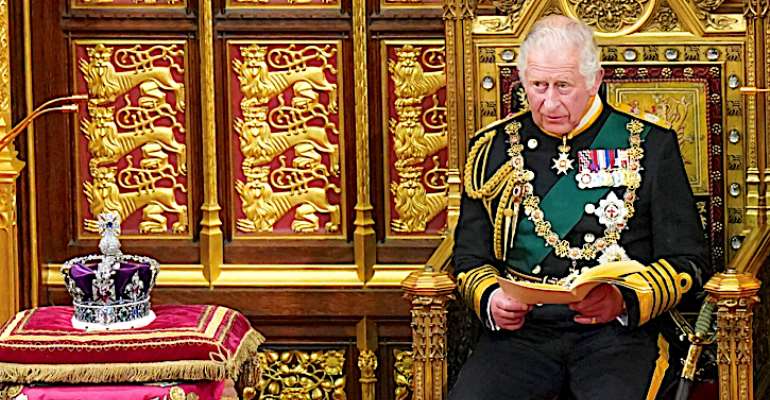King Charles 111: God Save The King.

The world has a brand new Monarch, he is the latest to ascend the tried and tested traditional throne of British Monarchy. King Charles the 111 , the king of England, and his wife, Camellia, are the new royalties.
King Charles at 73, was the oldest heir apparent to the throne in British history. He waited over 70 years to ascend the throne of his forebears, the throne of one of the world's most powerful, and enduring monarchies. He is the King of England and 14 other commonwealth realms.
King Charles late mother, Queen Elizabeth the 11, reigned for exactly 70 years, during which time a lot of developments took place in her Empire. Coincidentally, the Queen was on the African soil, during her trip to Kenya when she received the sad news of the passage of her father, King George the VI.
As the Queen, Elizabeth was the head of government during the colonial Africa and was the chief signatory to her Empire's wars, looting and neocolonialism. Colonialism was cruel. It remains a scare, infact, many view it as a perpetual wound. Africa was bought, beaten, and broken during the colonial times.
How did slave trade and colonialism impact on Africa negatively? Slavery aided the colonial masters in their bid to colonize Africa and subsequent resources exploitation, which they institutionalized under their imperial government. Slavery and colonialism is alleged to have laid the foundation for post colonial conflicts in Africa. The human impact of the slave trade is unimaginable.
Again, why does the British Monarchy continue to confound, excite and elicit awe?
The British Monarchy remains hugely relevant in United Kingdom, and beyond. What makes it so?
Queen Elizabeth was a very dynamic ruler. Even though she is steeped in tradition, she was able to move with world trend and carried both the monarchy and everyone along. She seriously resisted the temptations of interfering with government procedures and processes.
She was a symbol of stability, she lead with dignity and kept reinventing the monarchy.
Opinions remain divided on the expectations from King Charles 111. Some think he is not charismatic like the mother and may not be able to inspire fellowship from his subjects, and around the world.
Critics claim he interfered too much, and radically too, on government matters as the Prince of Wales and they fear he may not be able to purge himself of such tendencies.
Significantly, there has been great monarchies that has been swept away or aside by the forces of change, democracy, referendum, military coup, revolution, etc.
A monarch rules or reigns over a kingdom or empire, he holds preeminent position or power, he is a single ruler, usually a king or queen. There are absolute and constitutional monarchy.
There are 44 monarchies in the world today. 13 of them are in Asia, 12 are in Europe, 10 are in North America, 6 are in Oceanic and 3 are in Africa. However, there are only 29 monarchs recognized as head of nations. Of the 29, 4 are absolute while the rest 25 are constitutional monarchs .
Twenty nine monarchs rule over these twenty nine counties.... Andorra, Barahan, Belgium, Bhutan, Brunei, Cambodia, Denmark, Japan, Jordan, Kuwait, Lesotho, Leichesternn, Luxembourg, Malaysia, Monaco, Neither Lands, Norway, Oman, Samoa , Saudi Arabia, Spain, Swaziland, Sweden, Thailand, Tonga , United Kingdom, and Vatican city.
Oman, Swaziland, Saudi Arabia and Vatican city practice absolute monarchy and their heads are absolute monarchs. They head the state and head the government. They keep power for life or abdication.
In Africa, only Swaziland, now known as Eswatini has an absolute monarch. The king of Eswatini is absolute, he rules without bounds. The kings of Morocco and Lesotho, the other two monarchies in Africa, are bound by laws and customs.
In Africa as elsewhere around the world, there are sub regional monarchs. Some notable Nigeria monarchs are: The Obi of Onitsha, The Sultan of Sokoto, The Asagba of Asaba, The Oba of Benin, The Olu of Warri, The Emir of Kano. Every town or autonomous community has a traditional ruler or king.
Interestingly, the royal institution in Nigeria has lost considerable power and influence. Although most monarchs still perform useful religious functions that includes, settling land matters, minor chieftaincy issues and other not too serious misunderstandings amongst their subjects. Practically, sovereign government and monarchy seems an insurmountable contradiction in Africa and Nigeria with many critics suggesting it's scrapping. They believe monarchs are symbolic heads with no real powers.
The example of Nigeria s Governor Wike of Rivers State is still fresh . The governor on National television chided and ridiculed a king in his State, addressing him as a " small boy".
" You are wearing something that is bigger than you.... Uthman Dan Fodio clothes. Look at this small boy", the governor ripped into the mortified and crestfallen royal father, provoking laughter and excitement from his captive audience.
Mohammadu Sanusi 11, born into Fulani royalty, became the Governor of Nigeria's Central Bank, from where he ascended the throne of his forefathers as Emir of Kano. Sanusi will be later deposed as Emir by the State Governor. He was accused of arrogance and " total disrespect", and banished to Nasarawa State.
Beyond the high handedness of government leadership over traditional leadership in Africa, there are so much to learn by our royal fathers from the fallen British monarch and her monarchy.
Traditional rulers must perpetually exhibit Trustworthiness, Relevance, Stability and Be Impactful.
Queen Elizabeth was able to navigate Britain from a Colonial monarchy to a Modern one.
Long lived the Queen.
Long live the King!
